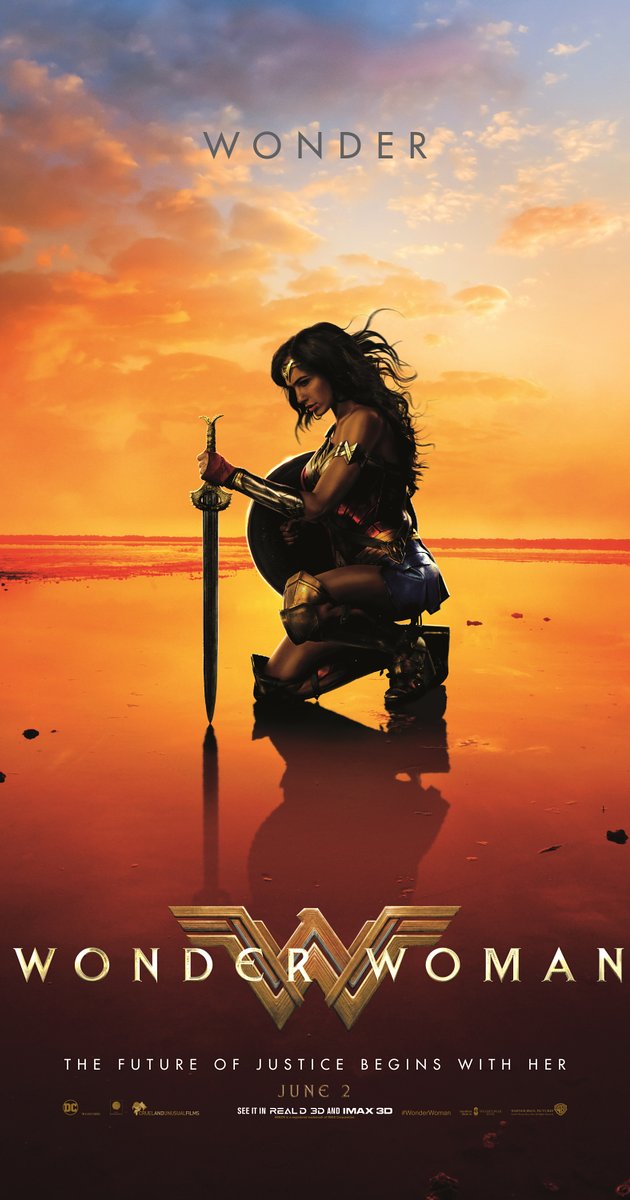Editor’s Note: This review contains extensive spoilers for Wonder Woman (2017).
 I recently had the opportunity (as many of you may have had) to see Wonder Woman in theaters. There has been much hype about this movie. Not only is it the first post-MCU superhero movie to star a heroine as the focal figure—that is Gal Gadot as Wonder Woman—but it was also directed by a woman, Patty Jenkins. The movie is quite entertaining, with all the elements that make superhero movies enjoyable: jam-packed action sequences, witty dialogue, tension and passion in the romance between the heroine and her love interest/partner, a despicable villain and his henchmen, a hidden enemy, the heroine’s moral crisis at seeing her worldview shattered in the face of reality, self-sacrificing courage, and a colorful cast of supporting heroes. You name it, and Wonder Woman has it.
I recently had the opportunity (as many of you may have had) to see Wonder Woman in theaters. There has been much hype about this movie. Not only is it the first post-MCU superhero movie to star a heroine as the focal figure—that is Gal Gadot as Wonder Woman—but it was also directed by a woman, Patty Jenkins. The movie is quite entertaining, with all the elements that make superhero movies enjoyable: jam-packed action sequences, witty dialogue, tension and passion in the romance between the heroine and her love interest/partner, a despicable villain and his henchmen, a hidden enemy, the heroine’s moral crisis at seeing her worldview shattered in the face of reality, self-sacrificing courage, and a colorful cast of supporting heroes. You name it, and Wonder Woman has it.
This movie, however, is based upon a great deal of mythology. I am not just referring to the Greek mythology that has shaped Wonder Woman’s character as a daughter of Olympus, and therefore a goddess herself, from the character’s comic book inception. Rather, I am referring to the myths of the First World War that this movie used to create the larger setting and context for its climactic battle between Diana and the God of War.
The First World War is characterized as a senseless war that is actively bringing untold suffering to millions of people across the globe when American pilot Steve Trevor haphazardly crashes into the seas around Themiscyra, the hidden island of the Amazon warriors. While it is certainly true that the First World War brought suffering to millions of people, the war was not senseless. As my book review of Hew Strachan’s historical treatise on the war makes clear, the First World War was fought by the Central Powers to redefine the world order and power dynamics of Europe in their image and liking while Britain and France entered the war to protect the sovereignty of Belgium and stop German authoritarianism from disrupting the balance of power in Europe. All myths of pointless rivalries aside, the German Empire had serious reasons for fighting the war to increase their power within Europe and the world’s trading system, while Britain had a vested interest in protecting its naval supremacy and overseas empire from attack and disruption. In addition, the ideas behind the war placed the Third French Republic and Britain’s parliamentary constitutional monarchy at odds with German autocracy. It did bring suffering and death, but not for petty reasons, for real reasons related to the geopolitics of the twentieth century world.
Second, Wonder Woman casts General Erich Ludendorff, co-leader of the German high command in the second half of the war, as a warmongering leader who believed that a secret weapon could achieve German victory in the war. It was true that Ludendorff believed that the German army had the ability to win the war even after his army was exhausted by its tactically successful but strategically insignificant gains during its 1918 Offensive. Ludendorff also failed to recognize the gravity of German setbacks when a new allied offensive, lead by British and French troops with the aid of American reinforcements, pushed the German army back into Belgium. Once the reality that Germany did not have reserves of manpower, equipment, or food to prosecute the war hit the German high command, armistice became the best option. Ludendorff, however, refused to admit that Germany was defeated militarily in the war. This was a reasonable (though incorrect) assumption for a man not prone to much introspection, seeing as Germany’s armies were still in the field and in hold of territory they had taken since 1914 when the armistice was declared. Rather than using a famous chemist to make deadly gas-bombs for use on the front, Ludendorff created the myth that the German army had been ‘stabbed in the back’ by revolutionaries and radicals at home. This idea was eventually picked up by a junior officer in the German army who used it as the underpinning of his memoir, Mein Kampf, in which he laid out his claim that the real traitors and enemies of the German people were European Jews.
Third, the movie casts the Entente’s high command as arrogant and uncaring about the lives of its soldiers on the front lines. This plays into the misconception that Europe’s arrogant and incompetent leaders led their men time and again into massacres that were unwarranted and a senseless waste of life. That assumption needs a lot of context. First, Europe’s generals were as astounded by trench warfare and the costs of combat as the ordinary soldiers. Raised fighting colonial wars with small, maneuverable forces against technologically inferior opponents in Asia and Africa, the leaders of Europe’s armies were not prepared materially or intellectually for the demands of trench warfare on the Western front. While disastrous decisions (or indecisions) of command did occur, leading to massive loss of life, the armies of both the Entente and the Central Powers evolved their tactics, their materiel, and their execution to fit the needs of trench warfare. By 1917, assaults were made on limited fronts and well-supported by artillery. Soldiers would march forward under a creeping barrage, keeping friendly artillery fire to their front. The first troops to march forward were ‘stormtroopers’ armed with machine guns and heavy rifles to drive off the majority of the enemy’s defenses while the second wave of troops took care of machine-gun nests or concrete bunkers in their assault. Finally, large numbers of reserves would be readily available to support the assault where extra reinforcements were needed. Moreover, the Entente and Germany’s generals even had their men train for their assaults to acclimate their troops to the conditions of a trench-warfare assault.

By the time of Wonder Woman just before the armistice, such tactical innovations were integral to the efforts of the Entente and the German army. While it is entirely plausible that a deity-warrior such as Diana could barge through a German trench, the troops who supported her attack would have had the tactical knowledge, material support, and training to achieve success without her presence. Moreover, the implementation of such tactics had enabled a more mobile form of warfare to replace the back-and-forth nature of offensives and counterattacks of 1915 and 1916. That being said, I much prefer the action sequence of Diana smashing through German trenches in the superheroine movie I eagerly wanted to see.
One historical detail of the movie that was really awesome to see on the big screen was the presence of the Ottoman Empire in the story. This shows that the war was global and that Germany was the leader of the Central Powers. Unlike the Entente, where the British and French were able to achieve some level of cohesive coordination, Germany used its allies as extensions of its own policies. Thus, Bulgarian troops fought for German purposes and Austria-Hungary feuded with Germany over the way that the German high command dictated rather than discussed strategy. So too with the Ottoman Empire, where Germany saw the war as a threat to Britain rather than an opportunity to align Ottoman and German interests. The presence of a weapons-testing facility and German and Ottoman troops protecting the facility together under Ludendorff’s leadership provided a glimpse into the real historicity of the alliance between the Ottoman and German Empires in the First World War.
In spite of its myths, Wonder Woman is a must see for any fan of DC or Marvel comics or any person who has a love for the historical settings of action-packed superhero movies. If you are new to history and to the superhero genre in general, Wonder Woman is a great place to begin. Enjoy your experience and know that Diana of Themiscyra will always be on watch to defend the innocent and show the world what a goddess truly can do.

4 replies on “More Myths than Greek Myths: Patty Jenkins’ Wonder Woman (2017)”
Thank you for addressing the WWI aspect of this! I was put out by the extreme imbalance I saw in the portrayal of the Germans as “the bad guys”, literally. While there was some material at the end that seemed to attempt to balance it out, I felt that with the presentation of the German troops and high command as it was that it might as well have been set in WWII; indeed I’ve seen a number of posts about the movie calling the German soldiers Nazis.
Thanks for your comment. Germany certainly did commit some acts of flagrant villainy during WWI, the invasion of Belgium being the most obvious example of that. Germany was also at fault for the war since the Kaiser gave Austria-Hungary a blank check to do whatever it pleased with Serbia after the assassination of Archduke Franz Ferdinand II. This led to an escalation of tensions and conflict between Austria-Hungary, Germany, and Russia that precipitated a global war. But I also did feel that the characterization of German leaders matched a more “Indiana Jones” style villain of utterly corrupt and deplorable Nazis rather than believable villains for a Wonder Woman movie. That being said, as a superhero movie there is a certain level of campiness to be expected. For example, the Red Skull incinerating Goebels and Himmler in Captain America: The First Avenger is very similar to Ludendorff gassing the entire German high command. Both scenes require a heavy suspension of disbelief to escalate the stakes of the hero or heroine’s encounter with the villain. If the Red Skull can kill evil Nazis at a whim, how bad is he and how will Captain America beat him? If Ludendorff is so cruel as to wipe out all of London, what will happen when Dianna faces him?
Hmm. Good points about campiness for drama, but I may take issue with “Germany was at fault for the war”. I’m on shaky ground here as I’m not really a historian, but if I’m not mistaken Germany didn’t enter the conflict until Russia declared war on Austria-Hungary, after they declared war on Serbia. Then Germany declared war on Russia and England and France got involved; a whole domino effect of alliances. And really most of Europe was spoiling for a fight, hence “powder keg”? I was under the impression that Germany got stuck with the reparations primarily because of insistance from France, which had both political and personal motivations.
I’m not saying that Germany committed no atrocities, certainly both submarine warfare and mustard gas argue against that point, and Germany may well have nudged Austria- Hungary towards the warpath, but everyone else except the US was pretty quick to jump on the bandwagon too. Is it actually possible to point at one country and say “they are responsible for WWI”? Just interested in a historian’s viewpoint.
Hi Riley: The general consensus of First World War historians is that Germany bears the vast majority of the blame for the war. This is certainly very different from how we learn it in school and how it’s spoken of in general discourse. A lot of that has to do with problematic revisionism that took place after the Second World War and even incorporates some Nazi-propagated myths (the Treaty of Versailles was actually less draconian than the treaty settling the Franco-Prussian War). Essentially, France and Britain were almost entirely reactive in their war decisions. Russia was a bit more aggressive, but then it had made clear that it was willing to risk a general war to defend Serbia and wasn’t in a position to mobilize partway. Austria-Hungary was certainly a pretty big risk taker, but only because it had the backing of Germany, which as Francis mentioned gave it essentially a blank cheque of support. I also can’t square universal guilt with the fact that Germany turned down an offer of arbitration from Britain because it was biting at the bit for war. Unfortunately, countries don’t have a great set of choices when an aggressor invades their territory (or in the case of Britain, Belgian territory). Germany didn’t *officially* enter the war until Russia got involved, but they knew that it was going that direction. A great book on this is Decisions for War, 1914-1917, by Hamilton and Herwig. Thanks, as always, for reading and discussing with us!